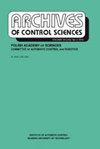Fuzzy goal programming technique for multi-objective indefinite quadratic bilevel programming problem
IF 1.1
4区 计算机科学
Q4 AUTOMATION & CONTROL SYSTEMS
引用次数: 0
Abstract
Bilevel programming problem is a non-convex two stage decision making process in which the constraint region of upper level is determined by the lower level problem. In this paper, a multi-objective indefinite quadratic bilevel programming problem (MOIQBP) is presented. The defined problem (MOIQBP) has multi-objective functions at both the levels. The followers are independent at the lower level. A fuzzy goal programming methodology is employed which minimizes the sum of the negative deviational variables of both the levels to obtain highest membership value of each of the fuzzy goal. The membership function for the objective functions at each level is defined. As these membership functions are quadratic they are linearized by Taylor series approximation. The membership function for the decision variables at both levels is also determined. The individual optimal solution of objective functions at each level is used for formulating an integrated pay-off matrix. The aspiration levels for the decision makers are ascertained from this matrix. An algorithm is developed to obtain a compromise optimal solution for (MOIQBP). A numerical example is exhibited to evince the algorithm. The computing software LINGO 17.0 has been used for solving this problem.多目标不定二次双层规划问题的模糊目标规划技术
双层规划问题是一个非凸的两阶段决策过程,其上一级的约束区域由下一级问题决定。研究了一类多目标不定二次规划问题(MOIQBP)。定义问题(MOIQBP)在两个层次上都具有多目标函数。下级是独立的。采用一种模糊目标规划方法,使两层负偏差变量的和最小,以获得每个模糊目标的最大隶属度值。定义了各层次目标函数的隶属函数。由于这些隶属函数是二次的,它们被泰勒级数近似线性化了。还确定了两层决策变量的隶属函数。每个层次上目标函数的个别最优解被用来形成一个综合的收益矩阵。决策者的期望水平由这个矩阵确定。提出了一种求解(MOIQBP)问题折衷最优解的算法。最后通过数值算例对该算法进行了验证。计算软件LINGO 17.0已经被用来解决这个问题。
本文章由计算机程序翻译,如有差异,请以英文原文为准。
求助全文
约1分钟内获得全文
求助全文
来源期刊

Archives of Control Sciences
Mathematics-Modeling and Simulation
CiteScore
2.40
自引率
33.30%
发文量
0
审稿时长
14 weeks
期刊介绍:
Archives of Control Sciences welcomes for consideration papers on topics of significance in broadly understood control science and related areas, including: basic control theory, optimal control, optimization methods, control of complex systems, mathematical modeling of dynamic and control systems, expert and decision support systems and diverse methods of knowledge modelling and representing uncertainty (by stochastic, set-valued, fuzzy or rough set methods, etc.), robotics and flexible manufacturing systems. Related areas that are covered include information technology, parallel and distributed computations, neural networks and mathematical biomedicine, mathematical economics, applied game theory, financial engineering, business informatics and other similar fields.
 求助内容:
求助内容: 应助结果提醒方式:
应助结果提醒方式:


